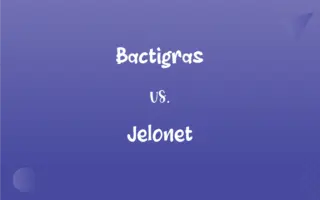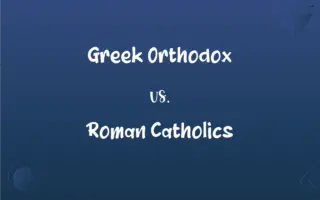Hepatic Vein vs. Portal Vein: What's the Difference?
Edited by Aimie Carlson || By Janet White || Published on February 23, 2024
Hepatic vein drains deoxygenated blood from the liver to the heart. Portal vein carries oxygen-rich and nutrient-laden blood from the gastrointestinal tract and spleen to the liver.

Key Differences
The hepatic vein is responsible for draining deoxygenated blood from the liver back to the heart. In contrast, the portal vein supplies the liver with nutrient-rich, oxygenated blood from the digestive organs and spleen.
The hepatic vein functions primarily in removing blood from the liver, ensuring efficient detoxification and metabolism. The portal vein, however, plays a crucial role in delivering substances for processing and filtration in the liver, aiding in digestion and nutrient absorption.
Anatomically, the hepatic vein is a part of the systemic venous system, connecting the liver with the inferior vena cava. The portal vein, on the other hand, forms from the confluence of the superior mesenteric and splenic veins, making it a key component of the portal venous system.
Conditions affecting the hepatic vein, like Budd-Chiari syndrome, can lead to liver congestion and damage. Diseases impacting the portal vein, such as portal hypertension, can cause significant complications including varices and ascites.
The hepatic vein’s role in blood detoxification and metabolism is vital, just as the portal vein’s contribution to nutrient and drug metabolism is crucial for overall bodily function.
ADVERTISEMENT
Comparison Chart
Primary Function
Drains deoxygenated blood from liver
Carries nutrient-rich blood to liver
Blood Direction
From liver to heart
From digestive organs to liver
Oxygenation Status
Carries deoxygenated blood
Carries oxygenated, nutrient-laden blood
Anatomical Path
Connects liver to inferior vena cava
Formed by the confluence of the splenic and mesenteric veins
Clinical Significance
Implicated in conditions like Budd-Chiari syndrome
Associated with disorders like portal hypertension
ADVERTISEMENT
Hepatic Vein and Portal Vein Definitions
Hepatic Vein
A vessel facilitating the outflow of processed blood from liver.
The hepatic vein ensures that metabolized substances are efficiently returned to the bloodstream.
Portal Vein
Transports blood rich in digestive end products for liver detoxification.
The portal vein plays a vital role in managing substances absorbed from the gut.
Hepatic Vein
An essential component of the liver's circulatory system, removing deoxygenated blood.
Disorders of the hepatic vein can lead to severe hepatic congestion and complications.
Portal Vein
A vein delivering nutrient-rich blood from the gastrointestinal tract to the liver.
The portal vein transports substances from the intestines for liver processing.
Hepatic Vein
Key in maintaining liver health by preventing blood accumulation.
The hepatic vein's obstruction can cause significant liver dysfunction and systemic effects.
Portal Vein
A major vessel in the portal venous system connecting digestive organs with the liver.
The liver receives a variety of nutrients and toxins through the portal vein for filtration.
Hepatic Vein
A vein that drains blood from the liver to the heart.
After detoxification in the liver, blood travels through the hepatic vein to the heart.
Portal Vein
A critical part of the hepatic portal system, aiding in nutrient absorption and detoxification.
Compromised portal vein flow can lead to serious conditions like portal hypertension.
Hepatic Vein
Part of the systemic venous system connecting the liver to the inferior vena cava.
The hepatic vein plays a crucial role in returning cleansed blood to the systemic circulation.
Portal Vein
Facilitates liver's role in metabolism by supplying it with blood from the spleen and intestines.
Drugs ingested orally are first encountered by the liver via the portal vein.
FAQs
Where does the hepatic vein lead to?
It connects the liver to the inferior vena cava.
What is the origin of the portal vein?
It forms from the confluence of the superior mesenteric and splenic veins.
What is the hepatic vein?
It's a vein that transports deoxygenated blood from the liver to the heart.
Can disorders of the hepatic vein affect liver function?
Yes, conditions like Budd-Chiari syndrome can severely impact liver health.
Does the portal vein transport oxygenated or deoxygenated blood?
It carries oxygenated, nutrient-laden blood.
What role does the hepatic vein play in metabolism?
It helps in removing metabolized substances from the liver.
What does the portal vein do?
It carries nutrient-rich blood from the gastrointestinal tract to the liver.
Can hepatic vein issues lead to heart problems?
Indirectly, as they can affect blood flow to the heart.
Is the hepatic vein part of the systemic circulation?
Yes, it's an integral part of the systemic venous system.
What conditions affect the hepatic vein?
Conditions like thrombosis and Budd-Chiari syndrome.
What's the clinical significance of the portal vein?
Its health is vital for proper liver function and overall metabolism.
Does the hepatic vein carry nutrient-rich blood?
No, it carries deoxygenated blood from the liver.
Can portal vein problems lead to digestive issues?
Yes, as it can affect liver function and thus nutrient processing.
What happens if the portal vein is obstructed?
This can lead to complications like portal hypertension and varices.
How does the portal vein impact drug metabolism?
Drugs absorbed from the gut first pass through the liver via the portal vein.
Is the portal vein essential for digestion?
Yes, it's crucial for transporting nutrients for liver processing.
How does the portal vein aid in liver detoxification?
It supplies the liver with substances from the diet for detoxification.
Is liver transplantation an option for severe hepatic vein diseases?
In some cases, it can be considered as a treatment option.
Are there surgical treatments for hepatic vein disorders?
Yes, depending on the condition, various surgical options are available.
Does lifestyle affect the health of these veins?
Yes, factors like diet and alcohol consumption can impact their health.
About Author
Written by
Janet WhiteJanet White has been an esteemed writer and blogger for Difference Wiki. Holding a Master's degree in Science and Medical Journalism from the prestigious Boston University, she has consistently demonstrated her expertise and passion for her field. When she's not immersed in her work, Janet relishes her time exercising, delving into a good book, and cherishing moments with friends and family.
Edited by
Aimie CarlsonAimie Carlson, holding a master's degree in English literature, is a fervent English language enthusiast. She lends her writing talents to Difference Wiki, a prominent website that specializes in comparisons, offering readers insightful analyses that both captivate and inform.







































































